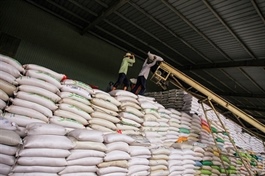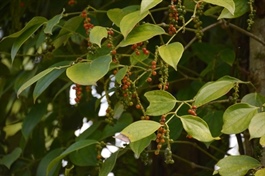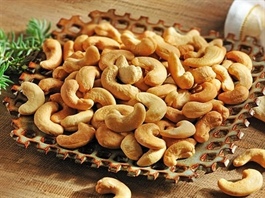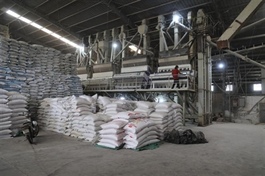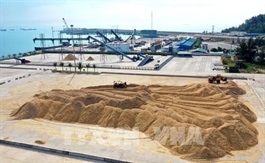Vietnam confronted by fierce competition from Thailand in durian export to China
Vietnam confronted by fierce competition from Thailand in durian export to China
Though the value of Vietnam's durian exports is expected to fall sharply through the end of 2023, several emerging problems must be solved in order to ensure the country’s competitive edge in the durian market is not lost to regional neighbor Thailand.
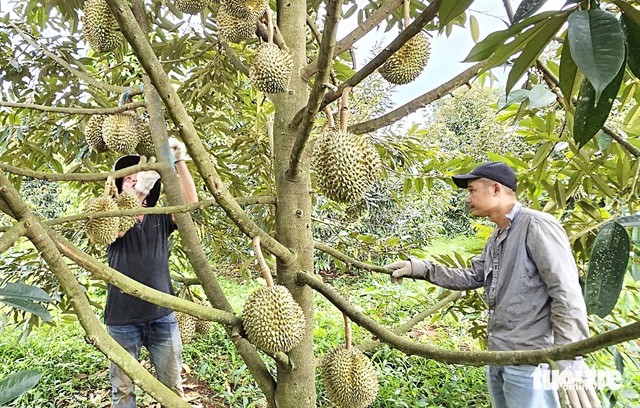
Although Vietnam's durian export value has increased sharply, the quality of the fruit is still considered rather unstable. Photo: N. Tri / Tuoi Tre |
Though the harvesting season is still several months away, Hoang Minh Niem, 69, a durian farmer from Cai Lay District, Tien Giang Province, southern Vietnam, receives calls nearly every day from retailers asking to purchase his crops.
But to whom Niem decides to sell his estimated 10 tonnes of durians is entirely dependent on who has the deepest pocket.
Fierce competition
“I am waiting for any trader who can pay more than VND80,000 [US$3.28] per kilogram,” Niem said.
“Once the price is set, I won’t allow traders to lower their bid. They must also harvest the durians themselves within an agreed-upon timeframe. I won’t give them an extension."
With durian demand at an all-time high and supply limited, farmers like Niem have more than enough leverage to set whichever contract terms they desire.
According to Nguyen Thi Sau, a durian trader from Cai Lay, competition within the durian market is staggering.
“One reason is that there are no durians to harvest right now but there is very high demand from the Chinese buyers. Many newcomers to the business hope to get rich from buying and selling durians, leading to a shortage of supply,” Sau explained.
“Many of these newcomers are willing to buy durians at high prices, so farmers often sell their fruit to them. Experienced traders like me know what prices are good for everyone, and we rarely buy at high prices because we won’t want to risk losses."
Nguyen Minh Hien, an experienced durian wholesaler from Tien Giang, is facing issues finding farmers willing to sell their durians for reasonable prices.
“Some growers have already signed contracts and received deposits but wind up canceling the deals the moment they get higher prices,” Hien added.
Such fierce competition will likely benefit durian farmers in the short term but create serious difficulties in the long run if unethical traders shift a focus from quality to quick profits, resulting in a decline in the reputation of Vietnamese durians, Hien remarked.
Lessons to learn
According to Ngo Van Dinh, an experienced fruit wholesaler in Ho Chi Minh City, fruits from Thailand, including durians, are better than those grown in Vietnam in terms of both quantity and quality due to the former’s compliance with national quality standards.
These benchmarks include regulations on harvesting in terms of timing, the size of the fruit, the thickness of the fruit’s flesh, and the fruit’s sweetness level.
“Authorities can punish anyone who violates these standards,” Dinh explained.
“This helps to brand not only Thai durians but also other fruits grown in Thailand. In contrast, [Vietnam] has few regulations and every farmer grows durians their own way.”
According to Dang Phuc Nguyen, secretary general of the Vietnam Fruit and Vegetable Association (VinaFruit), Vietnam is estimated to rake in $5.5-6 billion from durian exports to China this year.
Among China’s major import partners, Thailand ranks first with about $3.5 billion, followed by Vietnam at $1.7 billion.
Thailand has surpassed Vietnam in terms of not only export value but also production, turning out about 1.5 million tonnes of durians in 2023 – nearly double Vietnam’s durian output.
While Vietnam’s durian exports are steadily rising, the country still lags behind Thailand, and will likely continue lagging for the foreseeable future given that Vietnam only has 300-400 packing facilities while Thailand has thousands.
Considering these facts, Vietnam still falls far behind Thailand although the value of Vietnamese exports is much higher this year than last year. In the future, it will also be difficult for the Vietnamese durian to overtake its Thai rival.
Still, some hope remains if Vietnamese farmers can get their act together.
“Our farmers need to grow durians according to VietGAP standards and expand their cooperative efforts so that they can increase their growing areas and apply for the area codes,” Nguyen suggested.
“We also need to limit, and even stop, the chaotic conditions in the durian trade, particularly farmers not honoring signed contracts with traders. This leads to disruptions to trade and difficulties in landing future deals."
In addition, several companies in the industry have suggested that local authorities develop their own procedures for durian farming, adopt standard practices, and share technical know-how to improve productivity and quality.
China overtakes Vietnam in dragon fruit cultivation
China has a total 67,000 hectares of land dedicated to dragon fruit farming and is capable of producing 1.6 million tonnes of dragon fruits per year, VinaFruit said.
Vietnam, in turn, boasts just 55,000-60,000 hectares of land for dragon fruit farming and churns out 1.4 million tons of the fruit per annum.
The land allotted for dragon fruit farming in China rises about 10 percent each year, while that devoted to the cultivation in Vietnam has been steadily declining.
Moreover, the export value of Vietnamese dragon fruit has dropped to about $600 million in 2023 from over $1 billion in the 2017-21 period .
If China expands its cultivation area, it will have less need to import Vietnamese dragon fruits, giving rise to issues for Vietnam, which exports nearly 90 percent of its dragon fruits to its northern neighbor.
'It would also be good for us to rely on the Chinese market'
According to VinaFruit secretary general Nguyen, 80-85 percent of Thailand’s total fruit and vegetable exports go to China.
Thailand ships 22 official quota commodities to China, while Vietnam exports 12.
“With geographical proximity, Vietnam needs to improve its production process and increase the stability of quantity and quality of agricultural products to gain a foothold in the Chinese market, as demand is heating up in this market,” Nguyen said.
“Of course, we should actively diversify our export markets, but it would also be good for us to rely on the Chinese market."







